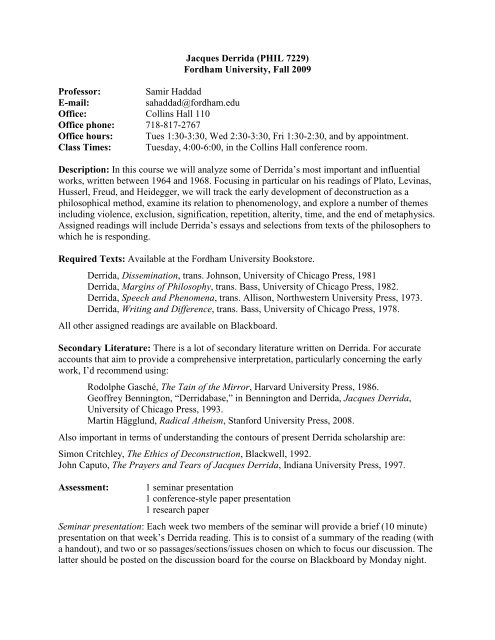Jacques Derrida - Fordham University Faculty
Jacques Derrida - Fordham University Faculty
Jacques Derrida - Fordham University Faculty
- No tags were found...
Create successful ePaper yourself
Turn your PDF publications into a flip-book with our unique Google optimized e-Paper software.
<strong>Jacques</strong> <strong>Derrida</strong> (PHIL 7229)<strong>Fordham</strong> <strong>University</strong>, Fall 2009Professor: Samir HaddadE-mail:sahaddad@fordham.eduOffice: Collins Hall 110Office phone: 718-817-2767Office hours: Tues 1:30-3:30, Wed 2:30-3:30, Fri 1:30-2:30, and by appointment.Class Times: Tuesday, 4:00-6:00, in the Collins Hall conference room.Description: In this course we will analyze some of <strong>Derrida</strong>’s most important and influentialworks, written between 1964 and 1968. Focusing in particular on his readings of Plato, Levinas,Husserl, Freud, and Heidegger, we will track the early development of deconstruction as aphilosophical method, examine its relation to phenomenology, and explore a number of themesincluding violence, exclusion, signification, repetition, alterity, time, and the end of metaphysics.Assigned readings will include <strong>Derrida</strong>’s essays and selections from texts of the philosophers towhich he is responding.Required Texts: Available at the <strong>Fordham</strong> <strong>University</strong> Bookstore.<strong>Derrida</strong>, Dissemination, trans. Johnson, <strong>University</strong> of Chicago Press, 1981<strong>Derrida</strong>, Margins of Philosophy, trans. Bass, <strong>University</strong> of Chicago Press, 1982.<strong>Derrida</strong>, Speech and Phenomena, trans. Allison, Northwestern <strong>University</strong> Press, 1973.<strong>Derrida</strong>, Writing and Difference, trans. Bass, <strong>University</strong> of Chicago Press, 1978.All other assigned readings are available on Blackboard.Secondary Literature: There is a lot of secondary literature written on <strong>Derrida</strong>. For accurateaccounts that aim to provide a comprehensive interpretation, particularly concerning the earlywork, I’d recommend using:Rodolphe Gasché, The Tain of the Mirror, Harvard <strong>University</strong> Press, 1986.Geoffrey Bennington, “<strong>Derrida</strong>base,” in Bennington and <strong>Derrida</strong>, <strong>Jacques</strong> <strong>Derrida</strong>,<strong>University</strong> of Chicago Press, 1993.Martin Hägglund, Radical Atheism, Stanford <strong>University</strong> Press, 2008.Also important in terms of understanding the contours of present <strong>Derrida</strong> scholarship are:Simon Critchley, The Ethics of Deconstruction, Blackwell, 1992.John Caputo, The Prayers and Tears of <strong>Jacques</strong> <strong>Derrida</strong>, Indiana <strong>University</strong> Press, 1997.Assessment:1 seminar presentation1 conference-style paper presentation1 research paperSeminar presentation: Each week two members of the seminar will provide a brief (10 minute)presentation on that week’s <strong>Derrida</strong> reading. This is to consist of a summary of the reading (witha handout), and two or so passages/sections/issues chosen on which to focus our discussion. Thelatter should be posted on the discussion board for the course on Blackboard by Monday night.
24 “Ousia and Grammē”, in Margins of Philosophy, pp. 31-53.Heidegger, Being and Time, §§6, 81-83 (pp. 19-27, 420-437).Aristotle, Physics, IV 10-14.Kant, Critique of Pure Reason, Sec 2 of the Trans. Aesthetic (pp. B46-B58).Hegel, Philosophy of Nature, §§253-259 (pp. 28-40).Dec 1 “Ousia and Grammē”, in Margins of Philosophy, pp. 53-67.Aristotle, Physics, IV 10-14.Heidegger, “The Anaximander Fragment”, esp. pp. 50-598 Paper presentations.15 Paper presentations.3
















